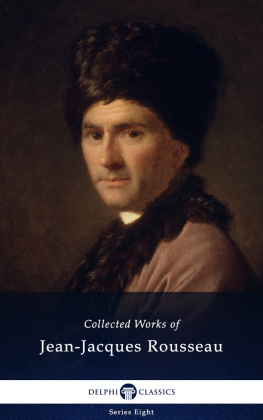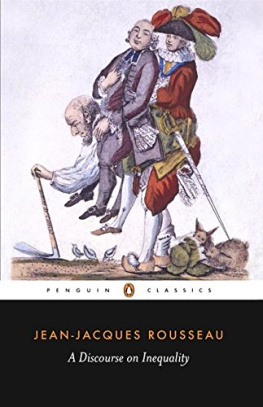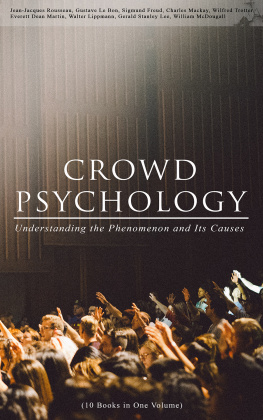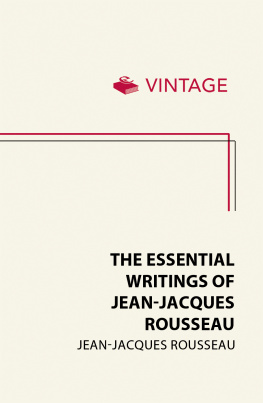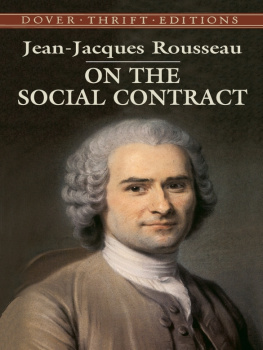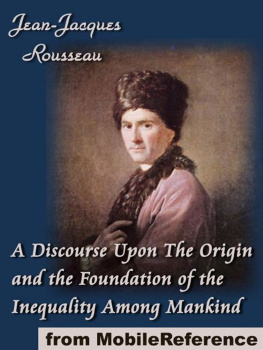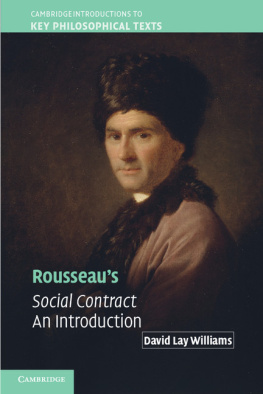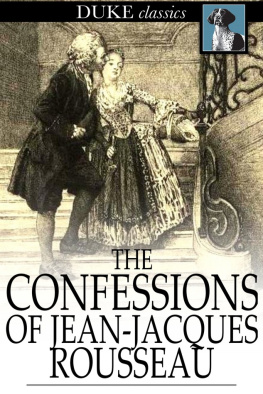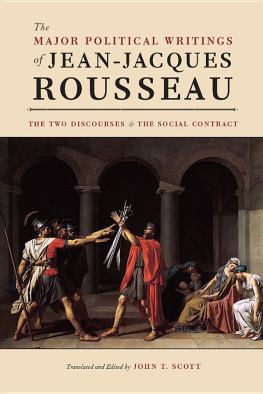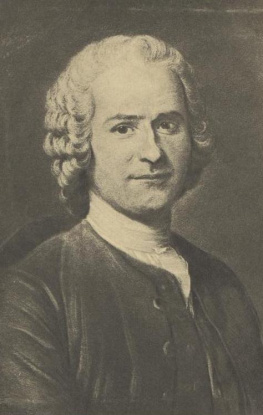Jean-Jacques Rousseau - Emile, or Education
Here you can read online Jean-Jacques Rousseau - Emile, or Education full text of the book (entire story) in english for free. Download pdf and epub, get meaning, cover and reviews about this ebook. City: London & Toronto, year: 1921, publisher: J.M. Dent and Sons, genre: Children. Description of the work, (preface) as well as reviews are available. Best literature library LitArk.com created for fans of good reading and offers a wide selection of genres:
Romance novel
Science fiction
Adventure
Detective
Science
History
Home and family
Prose
Art
Politics
Computer
Non-fiction
Religion
Business
Children
Humor
Choose a favorite category and find really read worthwhile books. Enjoy immersion in the world of imagination, feel the emotions of the characters or learn something new for yourself, make an fascinating discovery.

- Book:Emile, or Education
- Author:
- Publisher:J.M. Dent and Sons
- Genre:
- Year:1921
- City:London & Toronto
- Rating:4 / 5
- Favourites:Add to favourites
- Your mark:
- 80
- 1
- 2
- 3
- 4
- 5
Emile, or Education: summary, description and annotation
We offer to read an annotation, description, summary or preface (depends on what the author of the book "Emile, or Education" wrote himself). If you haven't found the necessary information about the book — write in the comments, we will try to find it.
Emile, or Education — read online for free the complete book (whole text) full work
Below is the text of the book, divided by pages. System saving the place of the last page read, allows you to conveniently read the book "Emile, or Education" online for free, without having to search again every time where you left off. Put a bookmark, and you can go to the page where you finished reading at any time.
Font size:
Interval:
Bookmark:
A collection of scholarly works about individual liberty and free markets. A project of Liberty Fund, Inc.
Jean-Jacques Rousseau , Emile, or Education. Translated by Barbara Foxley, M.A. (London & Toronto: J.M. Dent and Sons, 1921; New York: E.P. Dutton, 1921). http://oll.libertyfund.org/titles/2256
Rousseaus classic work on the philosophy and practice of education. Emiles tutor attempts to show how a young person can be brought up to fulfill their innate natural goodness in a corrupt society.
The text is in the public domain.
This material is put online to further the educational goals of Liberty Fund, Inc. Unless otherwise stated in the Copyright Information section above, this material may be used freely for educational and academic purposes. It may not be used in any way for profit.
| FIRST ISSUE OF THIS EDITION | 1911 |
| REPRINTED | 1914, 1918, 1921 |
All rights reserved
Edition: current; Page: [ vii ][ vii ]
Emile is a philosophical romance with three chief charactersEmile, Sophy, and Jean Jacques himself who moves to and fro, realising and explaining his character in every page. It is written with the enthusiasm and the conviction of the man who has tried every axiom it contains upon the strings of his own heart; and its purpose is to arouse and defend the susceptibility of the child who could grow into such a man by all the forces of education.
Rousseau was fifty when he wrote the book, and it followed closely on his Social Contract and New Helosa, that is to say, he was able to envisage his childhood, boyhood, and youth across the corrective experience of the years that for most men kill out the early illusions and only spare the ideals that can stand the wear and tear of reality. In his Confessions he reveals enough of his overwrought sensibility, his tears, his passions trs-ardentes, his effervescences de sang, to let us enlarge the picture he gives in Emile. We see him there an abnormally sensitive creature, a child that is both more and less of a child than the average. But this very excess has its advantage. The emotions, the love of beauty and desire for happiness, the sense of pain and fear, the vanity, the self-consciousness, being all carried to their extreme, are more certain of being brought to the sharper test. The risks they incur, the faculties they accompany and serve to hide, the pliant yet steadfast supports they need in the growth to maturity, are only to be understood and pointed out by one who, like the little Genevan boy, has felt their effect for good and evil in his own person.
Rousseaus method in dealing with these things is, it has been pointed out by his critics, by no means scientific. He arrives at the truth about them by rebelling violently against the untrue as he conceives it, or against whatever has been painful to himself in his own experience. And he took, as we remember, his childish ailments of the spiritual kind very badly; he had fevers where other youngsters have only stomachaches, and his nervous economy was abnormal. Let us Edition: current; Page: [ viii ] transform our sensations into ideas, he said more than once in his writings; and his ideas, even when he does get at them, are rather emotions of attraction and repulsion than ideas in the strictly philosophical sense.
We seem to hear him murmur to himself at every stage of his reminiscent and anticipatory thesis: Me voil redresseur des torts. He found the wrongs that the child suffered under the artificial eighteenth-century civilisation, as he saw it in France, a menace to the whole welfare of humanity. The emotion of revolt was strong in him from the first day he was able to feel the bonds, and nature had gifted him with an extraordinary power of conveying his emotion to others.
The most important of his teachings about education, says Lord Morley, sprang from his contempt of its dependence upon mere spoken injunctions and prohibitions, and his recognition of the deeper language of example and the more living instruction of visible circumstance. Many of the great changes that have since his day taken place in the theory and the art of education all over Europe, we may agree, are to be traced to the spread of this wise principle and its adoption in various forms. If the same writer unduly discounts Rousseaus sense of justice, seeing that one of the noblest pages in Emile is virtually a tribute to that quality, he makes rich amends in other ways. His recognition of the work as one of the seminal books of the worlds literature has almost become proverbial in Rousseau criticism. And as for its effect in the sphere of French ideasto state it fully, says Lord Morley, to strike the account truly, would be to write the history of the first French Revolution. Elsewhere in Europe the influence was almost as strong. Lavater was fired by him in Germany; Pestalozzi borrowed freely from Emile; and Jean Paul in Levana names the book as his impulsive source.
To-day its accent, its particular mode of edification, may seem at first a little out of fashion, and its contradictions and occasional failure in logic may spoil a few of its pages. Rousseau is affected in spite of himself by the male prejudice of his time and country, and the education of women as it is displayed to us in behalf of Sophy at the end of the book is a poor enough complement to that of Emile, the patternman. But those who turn to it remembering the circumstances in which it was written will conceive Emile and Sophy, the Savoyard Vicar and its author, as humanly Edition: current; Page: [ ix ] conditioned by their own day, and will not fail to realise again the power of the emotion it aroused. No one who reads it but will quarrel with some of its pages; no one who does so, having at heart the real education that is not in books or in rules, but in the actual commission of life itself, will fail to understand why Emile was called the childs charter, and to draw wisdom from it.
This collection of scattered thoughts and observations has little order or continuity; it was begun to give pleasure to a good mother who thinks for herself. My first idea was to write a tract a few pages long, but I was carried away by my subject, and before I knew what I was doing my tract had become a kind of book, too large indeed for the matter contained in it, but too small for the subject of which it treats. For a long time I hesitated whether to publish it or not, and I have often felt, when at work upon it, that it is one thing to publish a few pamphlets and another to write a book. After vain attempts to improve it, I have decided that it is my duty to publish it as it stands. I consider that public attention requires to be directed to this subject, and even if my own ideas are mistaken, my time will not have been wasted if I stir up others to form right ideas. A solitary who casts his writings before the public without any one to advertise them, without any party ready to defend them, one who does not even know what is thought and said about those writings, is at least free from one anxietyif he is mistaken, no one will take his errors for gospel.
Font size:
Interval:
Bookmark:
Similar books «Emile, or Education»
Look at similar books to Emile, or Education. We have selected literature similar in name and meaning in the hope of providing readers with more options to find new, interesting, not yet read works.
Discussion, reviews of the book Emile, or Education and just readers' own opinions. Leave your comments, write what you think about the work, its meaning or the main characters. Specify what exactly you liked and what you didn't like, and why you think so.

